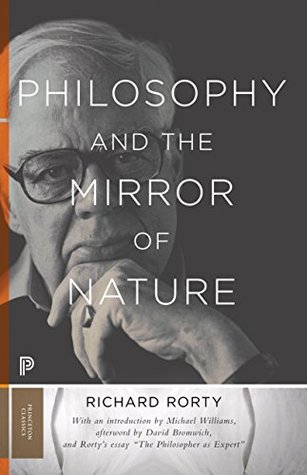Kindle Notes & Highlights
Read between
August 21 - December 26, 2020
tout commence en mystique et finit en politique.
kulturgeschichtliche
When I say that the professional philosophers are getting their due, I mean simply that, insofar as they aren’t (insofar, for example, as ideologues waste time that could be saved if they knew more philosophy), this is the result of human finitude—simple laziness and stupidity, on the part of both the professionals and their various audiences. But of course in this sense, no book, no tradition, and no discipline ever gets its due. To announce that professional philosophy should get more attention would be important only if its plight were a special case.
Santayana
By the time Philosophy and the Mirror of Nature appeared, I was a colleague of Dick’s, across the way in McCosh Hall at Princeton, seeing him regularly and being shown the later essays that would go into his second book, Consequences of Pragmatism. He was a careful reader, and greatly wished to be read with care—a quality, with him, occasionally hidden under a love of paradox and a dandyish dryness of tone. His conscientiousness was deeper than his pride. I sent him once a chapter of a book which argued that Kant had lapsed into conventional metaphysics in the Critique of Judgment when he
...more
This highlight has been truncated due to consecutive passage length restrictions.
His father, James Rorty, had been a poet of high reputation in the 1920s before he turned to reformist journalism in the 1930s, but I did not know the final phase of this lineage until Dick mentioned an article his father had written about the last hurrah of the fellow-traveling left: the Paul Robeson concert, held on September 4, 1949, just north of Peekskill, New York. The local populace had stopped the concert a week earlier. When it was rescheduled, they again caught wind of the event, and organized, and the concertgoers and performers trying to leave were mobbed by patriots armed with
...more
Nabokov,
Like William James in The Meaning of Truth, having thrown over the academic philosophy of his day, Rorty made it his mature ambition to abolish the value most cherished by philosophers. He called that value “Truth with a capital T.” His more-or-less Nietzschean variations on the theme were a spur to controversies with Hilary Putnam, John Searle, and others who wanted to preserve a sharper line between the natural and the moral sciences. Whether Rorty had the best of these disputes must be decided by judges better qualified than I. But his aim was easily misunderstood; it was not to deny the
...more
Intellectually, he was restless by nature, and showed several of the qualities he praised in his heroes: the ability to change the subject when the talk grew trite and conventional, to circumvent a useless procedure when it barred the way to a discovery, and to redescribe real and ideal objects, but never with a view to stopping the conversation. He made his points characteristically with “Homeric lists,” as he once called them, but the names were not always so miscellaneous as those above. More often, they were drawn from the broad but recognizable family of Hegel, Darwin, Nietzsche, Freud,
...more


